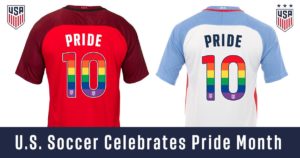Worthy Goal: US Soccer Celebrates Pride Month

Last month, the US men’s and women’s national soccer teams unveiled their latest jerseys. In celebration of Pride Month, the white home shirts and red away shirts now display rainbow numbers. Although aesthetically pleasing and encouraging from a progressive perspective, the jerseys received backlash. Swathes of commentary along the lines of: “keep politics out of sport,” “what about heterosexual pride numbers?” and comments about barring children from attending future US soccer games filled the online response sections of the websites that announced the change. While responses like these are unfortunately commonplace in the soccer world, the most astounding reaction came from twenty-three-year-old defender Jaelene Hinkle, who withdrew from the women’s squad citing “personal reasons.”
While it’s entirely possible that Hinkle withdrew from the squad for reasons having nothing to do with the shirts, it’s fairly well known and well documented that she’s a devout Christian who has vocally opposed same-sex marriage. After the Supreme Court’s 2015 ruling that legalized same-sex marriage, Hinkle referred to same-sex couples in an Instagram post as “lost, rejected, and abandoned,” hoping they would find “Christ.” In the same post, Hinkle talked about the symbolism of the rainbow as a “covenant made between God and all his creation” to ensure that the biblical floods will never occur again. Clearly Hinkle feels as though the rainbow has been unfairly co-opted by the LGBT community, a talking point absurdly compounded by many on the Far Right. So is it any coincidence that her withdrawal from the national team coincided with the league’s vocal support of the LGBT community?
Soccer has often tried to be an inclusive sport. Robbie Rogers, a midfielder for the Los Angeles Galaxy, came out in 2013. He expressed relief about his announcement, but stressed that the sports’ fecundity of LGBT players could yield more problems. Rogers has cited how British soccer players’ participation in borderline homophobic exchanges in the locker room is indicative of the sport’s need to grow and learn. Soccer in the UK is working on shedding that image, participating in the Rainbow Laces campaign where players exchange their shoelaces for more vibrant-colored ones to show solidarity with the LGBT community. Moreover, this year’s captains in the world’s most famous soccer league, the Premier League, unanimously decided to wear rainbow captain’s armbands. While, as Rogers stated, the sport has a long way to go, it is fantastic to see top officials, teams, and players work to root out homophobia from the sport.
The US national team, more than most federations, has worked to be inclusive to the LGBT community. After last years’ tragic attacks on Pulse nightclub in Orlando, Florida, the US men’s captain, Michael Bradley, sported the first rainbow armband adorned with “One Nation.”
Abby Wambach, widely considered the greatest female soccer player to ever wear the US jersey, World Cup-winning midfielder Megan Rapinoe, as well as a host of other 2015 World Cup players are openly lesbian, as is US coach Jill Ellis, who’s happily married to her wife. To say the women’s side is far more inclusive than the men’s is an understatement, making Hinkle’s decision to withdraw all the more puzzling. What exactly did she expect walking into the locker room? Wambach’s legendary presence still has a major influence on the team; Megan Rapinoe has surpassed a hundred appearances for her country; and potentially the greatest coach in the history of US soccer is there to welcome her and grant her the privilege of playing for her country. Yet, she cannot accept them, believing they are “lost, rejected, and abandoned.”
Many Christians have maintained Hinkle’s right to withdraw from the squad due to her religious beliefs. However, Ellis also reserves the right to not pick her again for a team that is supposed to represent a nation as diverse as the United States.
